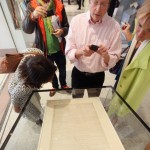I am human.
I am black.
I am proud.
These are declarations that can be made by a particular racial group in the United States of America. It is not a call to arms or dismissal of significant contributions made by the vast racial demographics that make up the face of America. It is simply meant to celebrate the contribution and significance of a particular group.
America should be proud that it is a country of such ethnic and cultural diversity. But during this month of recognition centered on Black History awareness, does it still remain a positive event or does it serve as nothing more than the passing of a cold winter month?
Josh Miller is a 21 year old English major in his junior year at Mercy. Miller is from Yorktown, New York and is proud of the diverse group of friends he has. He believes that everyone no matter what color or ethnic background, has something to learn from others, though he admits growing up it was a different story.
“I was raised in a bubble, a Wonder-bread land so to speak. I really did not begin to experience ethnic diversity until I moved away from home.”
So when Miller got to Mercy College, he decided to join the BSA (Black Students Association) when he was a freshman. He found it an experience that he would fondly carry the rest of his life.
It did not matter that he was white.
“When I was younger, in school I was exposed to contributions made to the country by African Americans, but found then less reinforced as I got older.”
Experience diversity he did. Miller was raised in a Jewish home and wanted to become involved with a group that could expand his limited exposure to others different from him. Though he was the only white kid at gatherings, he was never made to feel as if he should not be part of the group.
But Miller is not alone in the pride he has regarding his diverse group of friends.
Angie Bravo is a 19 year old freshman psychology major at Mercy College. She has a bubbly demeanor and her eyes, face, and smile combine to radiate a warm inner beauty. She is Hispanic and was born and raised in the Bronx. When asked, she is very enthusiastic when it comes to her beliefs regarding the significance of Black History month.
“To me, Black History Month is a time that a people can celebrate the troubles that they have overcome.”
Bravo does not discriminate when it comes to those she hangs out with and is close to. She is happy that this month is a time that some of her friends have to celebrate their heritage. Black History Month to her is still relevant and is a significant part of American history not to be overlooked.
Her sentiments are reflected in the words of another young lady who is a freshman at Mercy College this year.
Young Ashley August is 18. She is a film and television major with a diverse cultural background in her very own family. She grew up in the Flat Bush area of Brooklyn and smiles as she talks about her ethnic background.
“My mom is from a large city in Belize, my dad is part Scottish, part Hispanic and was raised out in the country there.”
Ashley laughs as she says that her parents actually met here in the United States and not their home country. Because she has so many different cultures within her family she does not identify with just one group. Her friends are as diverse as she is and she makes it a point to say that the only factor that determines past and future friend that there is a connection, regardless of skin color.
When asked about the significance of Black History Month Ashley sighs, and then pauses before she speaks.
“I believe that it is still relevant, but we all tend to forget about its true significance.”
August has a free spirit about her. She refers to hersel

f as a “free verse poet with no boundaries” and takes great pride in having that label. But when it comes to pride, what does a modern young college black man feel about pride in his race?
Jerrell Lawrence is a 21 year old junior and a media studies major at Mercy College. He plays for the school basketball team as a point guard. Tall in stature and very well spoken, he was born and raised in Jamaica Queens, New York and attended Catholic school growing up. Though his neighborhood was all black, he attended school with mostly white kids. Lawrence never felt intimidated by his school environment and was deeply influenced by his father’s passion for being a strong black man. He credits his father for his own sense of pride about being the young black man he is.
“My father was a big influence on who I am now. I also am inspired by Malcolm X, Jessie Jackson, Jessie Owens and Lew Alcindor. I want to be a leader like them.”
Lawrence says that though most of his friends are black, he could care less about the color of skin when it comes to choosing friends, and makes it a point to say that he does not discriminate in that regard. He likes all people and believes in social tolerance and respect for one another. When it comes to the question of Black History Month, he does have a very strong opinion.
“The significance of Black History Month is not very good with people today because it seems no one pays attention to it as they should.”
Lawrence’s view of how Black History Month is important but not given the focus among people it should echoes the opinions of Miller, Bravo and August.
These Mercy students stand out as beacons of hope for the country in their positive attitudes and acceptance of other Americans. But just like everything, Black History Month has a beginning and did not just magically appear.
Black History month actually began in 1926, initially only as a week. A Black scholar by the name of Dr. Carter G Woodson, a Harvard graduate, was concerned that there was no study of black history in his curriculum. Though there was representation of blacks, they were presented as being inferior. Woodson created the Association for the Study of Negro Life and History in 1915. Today it still exists as the Association for the Study of Afro-American Life and History.
Black History Week began to be celebrated as a month of reflection in 1926 because Dr. Woodson wanted to highlight the contributions that black people had made to American history. He chose February because it was the birth month of two men he felt had a key part to the history of blacks, Abraham Lincoln and Frederick Douglas. However, Black History Week officially became Black History Month in 1976.
Equality and the respect for all is the key to our survival on this third rock from the sun. As citizens experience this special month of the year, one passing thought should serve as an especially true anthem.
We are all human.
Some of us are black.
We should all be proud.








